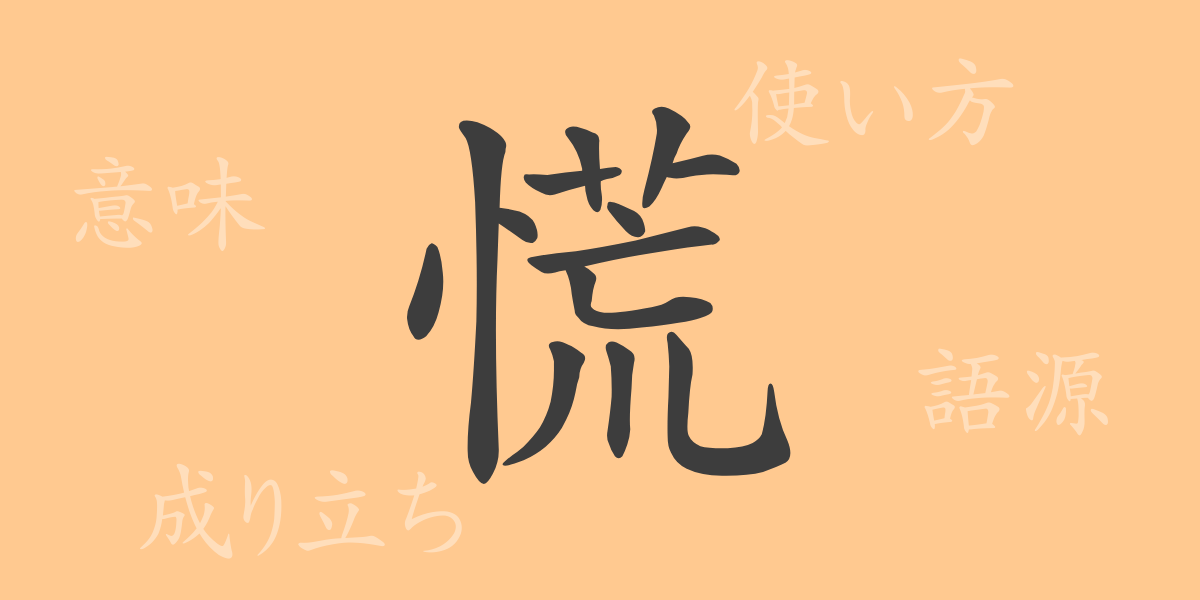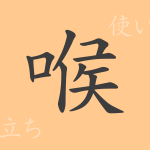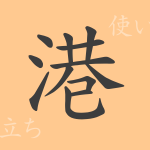The depth of Japanese script culture often brings surprise and discovery with each kanji’s meaning and origin. This time, we focus on the commonly used kanji “慌(あわ).” This kanji is intricately woven into daily life, essential for expressing emotions and situations. Let’s uncover the full scope of “慌(あわ),” from its origins to its meanings, usage, and the idioms and proverbs it forms.
Origin of 慌(あわ) (Etymology)
The kanji “慌(あわ)” originates from ancient China. It is a phono-semantic compound character derived from pictographs, combining the radical “忄” (りっしんべん), which means “heart,” and “荒” (あら), which indicates wildness or chaos. Originally, “荒” depicted a wild, tumultuous scene, and when combined with the heart radical, it came to represent inner turmoil or agitation. “慌” reflects how natural or situational disturbances affect one’s mental state.
Meaning and Usage of 慌(あわ)
The kanji “慌(あわ)” means “to panic” or “to be flustered,” signifying a state of unease or confusion. In Japanese, it is often used in words like “慌てる(あわてる)” (to panic) and “慌ただしい(あわただしい)” (busy, hurried). For example, “慌てて出かける(あわててでかける)” describes the act of leaving in a rush, unprepared. “慌ただしい一日(あわただしいいちにち)” means spending a busy, restless day. Using “慌(あわ)” conveys psychological agitation or a lack of time.
Readings, Stroke Count, and Radical of 慌(あわ)
Let’s delve into the readings and structure of the kanji “慌(あわ).”
- Readings: On-yomi (Chinese reading) is “コウ(こう),” and kun-yomi (Japanese reading) is “あわ.てる(あわてる)” and “あわ.ただしい(あわただしい).”
- Stroke count: “慌(あわ)” has 13 strokes.
- Radical: The radical is “忄” (りっしんべん), which relates to the heart and mind.
Idioms, Phrases, and Proverbs Using 慌(あわ)
There are various idioms, phrases, and proverbs in Japanese that include the kanji “慌(あわ).” Here are some examples:
- 慌ただしい(あわただしい): Describes a state of being busy and restless.
- 慌てふためく(あわてふためく): To be flustered or panic-stricken in the face of a situation.
- 慌て者(あわてもの): A person who is easily flustered or hasty.
- 慌忙として(こうぼうとして): To be in a state of panic or hurry.
These expressions use “慌(あわ)” to convey a sense of panic or confusion in various daily life situations.
Conclusion on 慌(あわ)
The kanji “慌(あわ)” is invaluable for conveying subtle nuances of emotion and action. From its origin to its meanings and usage, including related idioms and proverbs, it is widely used in Japanese. Understanding the kanji “慌(あわ),” which represents mental agitation, enriches Japanese expressions and deepens our appreciation for the language’s depth.

























